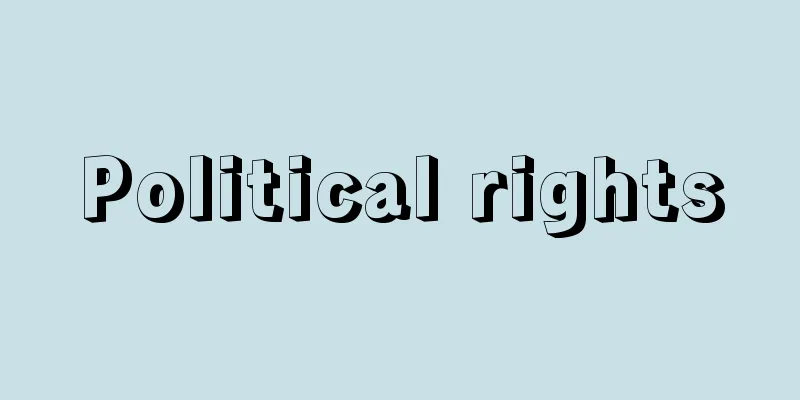Political rights

|
The German public law scholar Jellinek (1851-1911) classified fundamental rights into three types: freedom rights, rights to receive benefits, and the right to vote. He believed that the right to vote arises from the individual's "active status," that is, a relationship in which the individual willingly demands the activity of state power as an organ of the state. There are two types of suffrage: the right of citizens themselves to vote, such as in the election of legislators and national referendums on important policy decisions, and the right of public officials to vote in their positions. The term generally refers to the former. Article 15 of the Japanese Constitution generally stipulates that the right to select and dismiss public officials is an inherent right of the people, and more specifically, at the national level, four types of suffrage are stipulated: the right to vote for Diet members (Articles 43, 44, and 47), the right of popular review of Supreme Court judges (Article 79), the right to referendum on special local laws (Article 95), and the right to referendum on the approval of constitutional amendments (Article 96). Furthermore, for local governments, the right to vote for local assembly members and other public officials (such as governors and mayors) as determined by law is guaranteed to residents (Article 93), and the Local Autonomy Law also stipulates the right to request the dismissal of assembly members and local government leaders. In times when suffrage was restricted, the right of citizens to petition traditionally played an important role as a means of reflecting the will of the people in policy decisions, but as suffrage was expanded, this importance gradually weakened. However, even today the right to petition remains important as a complementary function to the right to vote. [Hideyuki Kawano] History of suffrageThere have long been opposing theories about the nature and basis of suffrage. On the one hand, it was considered an attribute or function that naturally accompanies citizenship, while on the other hand, it was considered a privilege to participate in the public affairs of the state, and only those with a certain level of property or political ability, that is, "wealth and education," should be able to take part in politics. It is true that in ancient Greek and Roman city-states, citizens naturally participated in the citizens' assemblies, directly involved in legislation, elections for important government positions, and even in the settlement of foreign relations and court cases, and it can be said that citizens' suffrage was guaranteed to the maximum extent. However, at the same time, it cannot be ignored that citizenship was limited to only boys born to fathers who had citizenship, women, minors, and many slaves had no suffrage, and that rights were not guaranteed to citizens of other cities, even if they were of the same ethnicity. Later, when the estates-based parliament system was adopted in the feudal society of medieval Europe, suffrage came to be seen as a feudal privilege associated with land ownership, as the English phrase "no taxation without representation" implies. In other words, the idea was that citizens who paid large amounts of tax to the state were guaranteed a certain degree of say in politics. These two trends were inherited as they were in modern society. The ideological doctrines of the civil revolution in the 17th and 18th centuries asserted that suffrage was an inherent attribute of citizens. Article 6 of the French Declaration of the Rights of Man of 1789 stated, "All citizens have the right to take part in the making of laws, either by themselves or through their representatives. ... All citizens, being equal before the law, are equally entitled to all public offices." However, the French Constitution of 1791, which came shortly thereafter, divided citizens into active and passive citizens based on property, and limited those who could actually exercise sovereignty to active citizens. These active citizens were only about 4.3 million out of a total population of 26 million, and furthermore, only a little less than 50,000 were qualified to be electors selected by them. Therefore, it can be said that equality among the elites selected by restricting the qualifications of citizens was actually only guaranteed. [Hideyuki Kawano] Expanding suffrageHowever, this situation changed drastically from the 19th century to the 20th century. In the UK, voting rights were significantly restricted until the beginning of the 19th century, and electoral districts were not revised for a long time, so cities such as Birmingham, which developed during the Industrial Revolution, were not represented, and there were many corrupt electoral districts or pocket electoral districts (restricted electoral districts) with few voters, and there were even cases where members of parliament were elected from cities that had been submerged under the sea. To improve this situation, the Electoral Act was revised in 1832, revising electoral districts and relaxing voting qualifications, increasing the number of eligible voters by about 50%. After that, in 1918, universal suffrage for men was fully implemented, and women's suffrage was partially granted. In Japan, the 1889 (Meiji 22) Election Law granted the right to vote to men aged 25 or older who paid at least 15 yen in direct national taxes, but this number was only 450,000, or about 1% of the population. Universal male suffrage was subsequently introduced in 1925 (Taisho 14), and after World War II, the right to vote was granted to both men and women aged 20 or older in 1945 (Showa 20). [Hideyuki Kawano] The Act to Partially Amend the Public Offices Election Act (Act No. 43 of 2015), enacted in June 2015, changed the voting age for public office elections from 20 years old to 18 years old. The revised law went into effect on June 19, 2016. [Editorial Department] "New Lectures on the Constitution, Vol. 1" by Kobayashi Naoki (1980, University of Tokyo Press)" ▽ "Constitution and Parliamentary Government" by Ashibe Nobuyoshi (1971, University of Tokyo Press)" ▽ "Suffrage" by Ito Yoshihiro (included in "Lecture Series: The Basics of Constitutional Studies 2, Basic Concepts of Constitutional Studies II", 1983, Keiso Shobo)" ▽ "Study of Suffrage, edited by the Constitutional Theory Research Group (1987, Yuhikaku)" ▽ "The Right to Vote as a 'Right' - The Essence of the Right to Vote and Electoral Issues in Japan" by Tsujimura Miyoko (1989, Keiso Shobo)" ▽ "Towards the Maturity of a Democratic Electoral System - From the Perspective of Developing a Political Culture Foundation" edited by the Japan Association for the Study of Elections (1992, Hokuju Publishing)" [References] | | | | | | | | | |Source: Shogakukan Encyclopedia Nipponica About Encyclopedia Nipponica Information | Legend |
|
ドイツの公法学者イェリネック(1851―1911)は、基本権を自由権・受益権・参政権の3種に分類し、参政権は個人の「能動的地位」、つまり個人が進んで国家機関として国家権力の活動を要求する関係から生まれるものとした。 参政権には、議員の選挙や重要な政策決定に関する国民投票のような国民自身がもつ参政権と、公務員がその地位においてもつ参政権の2種が区分されるが、普通一般には前者のことをいう。日本国憲法では、第15条で公務員選定罷免権が国民固有の権利であることを概括的に定めており、また具体的には、国の場合については、国会議員の選挙権(43条・44条・47条)、最高裁判所裁判官の国民審査権(79条)、地方特別法に対する住民投票権(95条)、憲法改正の承認に関する国民投票権(96条)の4種が規定されている。さらに地方自治体については、地方議会の議員、および法律で定めるその他の吏員(知事・市町村長など)の選挙権を住民に保障し(93条)、さらに地方自治法で議員・首長の解職請求権が規定されている。なお参政権の制限された時代においては、国民の請願権が、国民の意思を政策決定に反映させる手段として、伝統的に重要な意味をもっていたが、参政権の拡大とともにしだいにその重要性を弱めていった。しかし今日においても請願権は参政権の補完機能として重要である。 [川野秀之] 参政権の歴史参政権の性質あるいは根拠については、古くから対立する学説が存在していた。一方では、それは市民権に当然付随する属性あるいは機能だと考えられ、他方では、それは国家の公務に参与する特権であり、そのためには一定の財産ないし政治的能力、すなわち「富と教養」をもつ者のみが政治に参加すべきであると考えられた。 確かに、古代ギリシアやローマの都市国家においては、市民は当然に民会に参加し、直接に立法や重要官職の選挙、外交関係の処理裁判まで行い、市民の参政権は最大限に保障されていたといえる。しかし同時に市民権は、市民権をもつ父親から生まれた男子にのみ限定され、女性や未成年者、多数の奴隷にはなんらの参政権もなく、同じ民族でも他の都市の市民には権利の保障がされなかったということを無視するわけにはいかない。その後ヨーロッパ中世の封建社会において身分制議会の制度が採用されるとともに、「代表なくして課税なし」というイギリスのことばが意味するように、参政権は土地所有に伴う封建的な特権とみられるようになった。いうなれば、国家に多額の税金を納める国民には一定限度の政治に対する発言権を保障するという考え方である。 このような二つの流れは、そのまま近代社会に受け継がれた。17、18世紀の市民革命の思想学説においては、参政権は国民固有の属性であると主張されている。1789年のフランス人権宣言の第6条には、「すべての市民は自らまたはその代表者によって法律の制定に参与する権利を有する。……すべての市民は法律の前に平等であるため、……等しくすべての公職につくことができる」と述べられていた。しかしその直後の1791年のフランス憲法では、財産によって市民を能動的市民と受動的市民に分け、主権を実際に行使できる者を能動的市民に限った。この能動的市民は全人口2600万人中約430万人にすぎず、さらに彼らが選んだ選挙人の資格を有する者は5万人弱にしかすぎなかった。したがって、市民の資格を制限することによって選ばれたエリートたちの間の平等が、実際には保障されていたにすぎなかったといえよう。 [川野秀之] 参政権の拡大しかしこのような状況は19世紀から20世紀にかけて急激に変化していった。イギリスでは19世紀の初めまで選挙権がかなり制限されており、しかも長期にわたって選挙区割が改正されなかったため、産業革命によって発達したバーミンガムなどの都市が代表されず、選挙民の少ない腐敗選挙区あるいはポケット選挙区(制限選挙区)が多数存在し、なかには海中に没した都市から議員が選ばれるといった状況すら存在した。このような状況を改善するために1832年選挙法改正が行われ、選挙区割を改定するとともに、選挙資格を緩和し、有権者が約50%増加した。その後1918年には完全に男子の普通選挙が実施され、女性参政権も一部認められた。 日本では1889年(明治22)の選挙法で、25歳以上の男子で直接国税15円以上を納めている者に選挙権が認められたが、その数は人口の約1%の45万人にすぎなかった。その後1925年(大正14)に男子普通選挙が、第二次世界大戦後、1945年(昭和20)には20歳以上の男女に選挙権が認められた。 [川野秀之] 2015年(平成27)6月に成立した「公職選挙法等の一部を改正する法律」(平成27年法律第43号)により、公職の選挙の選挙権を有する者の年齢について、満20年以上から満18年以上に改められた。改正法の施行は2016年6月19日。 [編集部] 『小林直樹著『新版憲法講義 上』(1980・東京大学出版会)』▽『芦部信喜著『憲法と議会政』(1971・東京大学出版会)』▽『伊藤良弘著「参政権」(『講座・憲法学の基礎2 憲法学の基礎概念Ⅱ』所収・1983・勁草書房)』▽『憲法理論研究会編『参政権の研究』(1987・有斐閣)』▽『辻村みよ子著『「権利」としての選挙権――選挙権の本質と日本の選挙問題』(1989・勁草書房)』▽『日本選挙学会編『民主的選挙制度成熟へ向けて――政治文化基盤整備の視点から』(1992・北樹出版)』 [参照項目] | | | | | | | | | |出典 小学館 日本大百科全書(ニッポニカ)日本大百科全書(ニッポニカ)について 情報 | 凡例 |
<<: Samsung Group - Samsung Group
>>: Acid rock - Sanseigan (English spelling)
Recommend
Klenze, Leo von
Born: February 29, 1784 in Halberstadt Died Januar...
Ichijo Dojo
…It is called Inakusan Fukuoin. It was formerly c...
Kusatsu-bushi - Grass-crushing
This folk song first began to be sung in Kusatsu ...
Ruins of the Old Cun Castle (English: Niú cūn gǔ chéng zhǐ)
The site of a castle from the Spring and Autumn Pe...
Ouchi (Fukushima) - Ouchi
...Agriculture has focused on rice and tobacco cu...
Omaki [Hot Spring] - Omaki
This hot spring is located in Toga Village, Higash...
Miyako Dance - Miyako Dance
A dance gathering for geisha from Gion, Kyoto. It...
Alpine Club - Alpine Club
The name means "mountaineering club," bu...
Daigo [town] - Daigo
A town in Kuji District, northern Ibaraki Prefectu...
Betterton, Thomas
Born: Around 1635, London [Died] April 28, 1710. L...
Seasonally adjusted - Kisetsuchoseiichi
…Seasonal patterns are often considered exogenous...
Arzaker - To make fun of
Please see the "Zarkali" page. Source: ...
Zero Focus
1. A full-length mystery novel by Seicho Matsumoto...
Voit, C.von (English spelling) VoitCvon
…He worked on physiological and chemical research...
New Language Works - Gengo Shinsaku
Neologism, also known as neologism, is the creatio...









